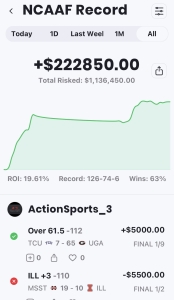When it comes to sports betting, there are many different approaches and strategies that people use to try and make a profit. One such strategy is to follow the picks of a handicapper, someone who uses their knowledge and expertise to provide recommendations on which teams or players to bet on. However, the question arises: should handicappers document their betting record on a sports monitor?
The answer is not a straightforward one, and there are arguments to be made on both sides. On the one hand, if a handicapper is confident in their abilities and truly believes that they can provide profitable picks, then documenting their record on a sports monitor can be a way to prove their credibility and attract more customers.
However, on the other hand, posting a betting record also opens up the handicapper to scrutiny and criticism. If their record shows that they have a losing record, then potential customers may be turned off and look elsewhere for their betting advice. Additionally, as mentioned by handicappingwebsites.com, very few handicappers have a truly winning record over the long term.
 Despite the risks, there are still some handicappers who choose to document their record on a sports monitor. One such handicapper is ASCpicks.com, who has a lifetime record of 63% in college football and has provided over 1000 documented picks over 2 years. This kind of track record is impressive and can help to establish credibility with potential customers.
Despite the risks, there are still some handicappers who choose to document their record on a sports monitor. One such handicapper is ASCpicks.com, who has a lifetime record of 63% in college football and has provided over 1000 documented picks over 2 years. This kind of track record is impressive and can help to establish credibility with potential customers.
However, from the standpoint of handicappers wanting to sell picks, the data from handicappingwebsites.com suggests that it may not make a significant difference. Handicapping is ultimately an impulse buy, and bettors may be more swayed by a compelling blog post with insightful analysis than by a documented betting record.
In conclusion, there is no one-size-fits-all answer to whether handicappers should document their betting record on a sports monitor. It ultimately comes down to personal preference and risk tolerance. While a winning record can help to establish credibility, it also opens the handicapper up to scrutiny and criticism. Regardless of whether a handicapper chooses to document their record, providing insightful analysis and valuable information can be just as effective in attracting customers.
